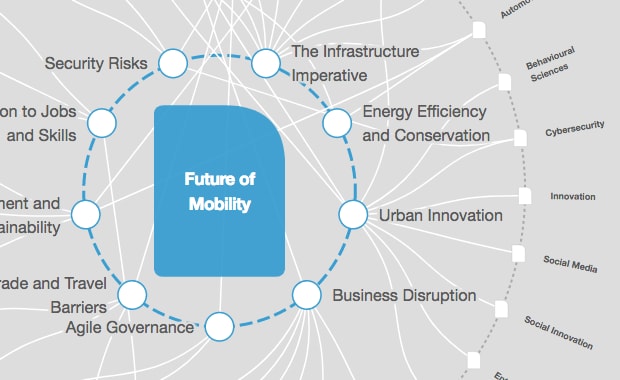How the automotive industry is gearing up into sustainability’s fast lane

The automotive industry is aiming to achieve a more resilient and sustainable supply chain. Image: Reuters/Phil Noble

Explore and monitor how Mobility is affecting economies, industries and global issues

Get involved with our crowdsourced digital platform to deliver impact at scale
Stay up to date:
Mobility
Listen to the article
- Growing geopolitical tensions and unexpected crises have disrupted the automotive and mobility supply chains.
- The global automotive industry must reinforce the resiliency of its supply chains, while taking strides towards sustainability.
- Creating transparency along value chains in the mobility sector is a fundamental step in becoming more resilient and sustainable.
Increasing geopolitical instability and a series of unprecedented crises have disrupted the automotive and mobility industries. These disruptions have had a significant impact on our global businesses and supply chains: The semiconductor shortage alone resulted in a loss in global production of 11 million vehicles in 2021. Adding to the complexity are extended regional and global shutdowns due to the COVID-19 pandemic, current energy shortages and inflationary headwinds resulting from the ongoing conflict in Ukraine. How do we mitigate supply risks and price volatility to ensure sustainable transport ecosystems are available for all?
Ensuring resiliency is particularly challenging given the supply chain transformation companies committed to as part of their decarbonization agenda: We are at a tipping point when it comes to accelerating our net-zero emissions journey towards 2050. The significant footprint the automotive and mobility industries have on our planet is undeniable, corresponding to approximately 10% of annual global greenhouse gas emissions. Other sustainable development goals (SDGs) beyond greenhouse gas (GHG) emissions, such as air quality (goal 3), reduction of water and energy depletion (goals 6 and 7) as well as material waste through circularity (goal 12), can also be supported by automotive industry action.
The state of global value chains and the impacts of the automotive industry warrant a collaborative effort on various fronts. We prioritize the following three areas for collaboration, with an appropriate approach to deliver on each:
1. Public-private coordination will unlock global automotive value chain transparency
A modern vehicle consists of more than 30,000 components, making the task of gaining a comprehensive view of its entire value chain – from raw materials all the way through to end-of-life – immensely complex. The growing number of sustainability regulations, standards, tools and collaborative initiatives adds to the difficulty of doing this. A strong need exists for collaboration and shared responsibility assessment among the private and public sectors in order to accelerate the transition to net zero.
Creating transparency along value chains is a key enabler, allowing us to identify risks and jointly develop effective mitigation strategies early on, and will require appropriate information-sharing among trusted partners. Recognizing this, we as corporate leaders representing global mobility ecosystem enterprises are ready to work side by side with governments and engage in consequential public-private dialogues representing a non-competitive exchange of information for the good of all stakeholders in the automotive and mobility industries.
2. A sustainability footprint compass will serve as a navigation tool to accelerate the transition to net-zero
The automotive industry currently lacks a common view on sustainability assets. This causes confusion and hampers the transformation to a sustainable industry. To address this, we will create a map of mobility-relevant standards, regulation, tools and collaborations on sustainability globally. This compass will allow us to identify opportunities for collaborations in non-competitive situations and enable us to set priority areas for the industry.
3. A toolkit to increase value chain transparency as an enabler to resilience
The trends identified above highlight the importance of transparency for key automotive value chains such as semiconductors and batteries. For this purpose, we will create a toolkit that provides transparency in terms of demand/supply balance as well as regional consolidation and highlights strategic recommendations to address key industry risks through non-competitive collaborations. The ability to identify potential future value chain disruptions early on would allow us to address resiliency challenges ahead while achieving our sustainability goals.
Only by working together can we build truly resilient and sustainable automotive and mobility industries of the future. And here, time is of the essence. That’s why we are calling on our peers in the private sector to join us in pursuing our objectives. It needs to be a concerted effort if we are going to be able to achieve greater transparency and address the resiliency and sustainability challenges that lie ahead.
• Learn more about the World Economic Forum's collaboration with the automotive industry here and about Resilient Automotive Value Chains here.
Don't miss any update on this topic
Create a free account and access your personalized content collection with our latest publications and analyses.
License and Republishing
World Economic Forum articles may be republished in accordance with the Creative Commons Attribution-NonCommercial-NoDerivatives 4.0 International Public License, and in accordance with our Terms of Use.
The views expressed in this article are those of the author alone and not the World Economic Forum.
The Agenda Weekly
A weekly update of the most important issues driving the global agenda
You can unsubscribe at any time using the link in our emails. For more details, review our privacy policy.
More on Forum InstitutionalSee all
Spencer Feingold and Gayle Markovitz
April 19, 2024
Kate Whiting
April 17, 2024
Andrea Willige
March 27, 2024
Shyam Bishen
March 20, 2024
Simon Torkington
March 15, 2024





